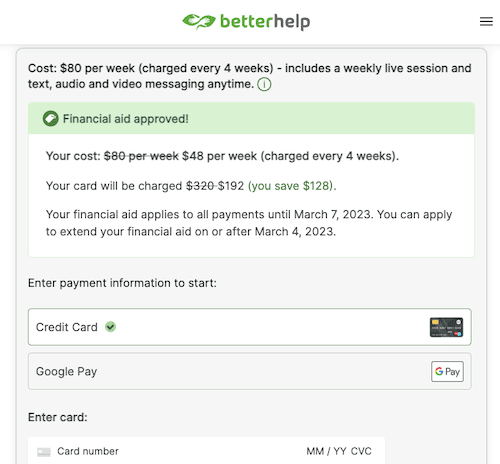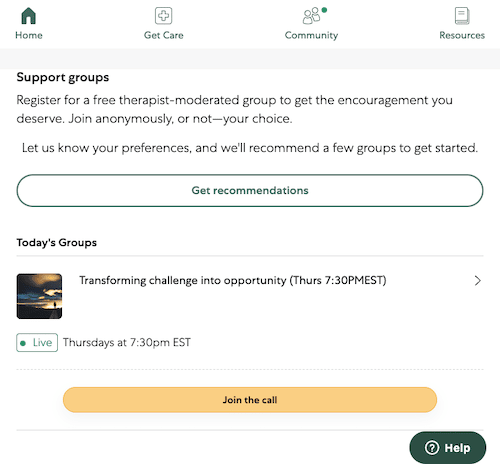Most Affordable Online Therapy Platforms in 2025
Key Takeaways
- Online therapy platforms allow you to have virtual therapy sessions at scheduled times from anywhere with an internet connection.
- Online therapy sessions cost between $15–$90 a session among the most affordable online therapy platforms we researched.
- Some platforms accept insurance, Medicare, and Medicaid for their online therapy services.
Online therapy can provide a convenient and accessible way to receive mental health care remotely. While the traditional way of accessing therapy involves going to a therapist’s office for an in-person session, online therapy allows you to attend your therapy session using your phone, tablet, or computer from anywhere with an internet connection.
Our Reviews Team researched the best online therapy providers and found the most affordable online therapy services for people to access mental health care virtually. This review considered factors like insurance coverage, financial assistance programs, and extras to help you get the most value when investing in your mental wellness.
The most affordable online therapy platforms of 2025
- BetterHelp: Most Affordable Online Therapy Overall
- Calmerry: Most Affordable Messaging Therapy
- Monument: Most Affordable Online Alcohol Use Treatment
- Open Path: Best for Paying per Session
Why you can trust our Reviews Team’s online therapy reviews
Our Reviews Team recommends products and services we believe provide value in the lives of our readers. We spent more than 1,000 hours carrying out in-depth research on mental health, substance use disorders, and online therapy to give you the most accurate review. To make our selections, we:
- Consulted with mental health experts to understand online and in-person therapy best practices
- Reviewed and mystery shopped more than 40 online therapy platforms
- Read real reviews from verified customers on trusted third party sites, including the Better Business Bureau (BBB) and Trustpilot to understand users’ experiences
- Kept up to date on the latest academic research on therapy and mental health
Read more about our online therapy review methodology.
Table 1, Compare the most affordable online therapy platforms of 2025
| Types of therapy | Video, audio, chat | Video, chat | Video | Video |
| Cost per month | $240–$360* | $228–$360† | $15–$249† | $120–$240* |
| Accepts insurance | No | No | Yes | No |
| Offers financial aid | Yes | No | No | No |
| Offers first-time discounts | Yes | Yes | No | No |
* Monthly cost depends on location, preferences, and availability of therapists
† Monthly cost depends on plan selected
Most Affordable Online Therapy Overall: BetterHelp
Pros
- Unlimited messaging with therapist
- Unlimited therapist-led group webinars
- Weekly live therapy sessions
- Financial assistance for eligible individuals
- Offers 20% off your first month with the coupon code “NCOA”
Cons
- Doesn’t accept insurance, including Medicaid or Medicare
Cost: $240–$360 per month
Accepts insurance: No
Accepts Medicaid: No
Accepts Medicare: No
Offers financial aid: Yes
Session format options: Live video, phone, or chat; unlimited messaging between appointments
Session length: 30–45 minutes
Extras: Virtual group seminars
BetterHelp is a platform that offers online therapy for $240–$360 per month, or $60–$90 per week. It offers location-based pricing, meaning your cost will depend upon where you live and the number of licensed therapists in your state. BetterHelp is the only affordable online therapy platform on our list that offers financial assistance that can discount your monthly subscription by up to 40%, meaning your final cost may be less than the advertised $240–$360 per month.
To determine how much financial aid you’re eligible for, BetterHelp will ask a series of questions during the sign-up process, including questions about your employment status and whether you’re a veteran, have a disability, or low-income. You’ll then be asked to create an account by entering your name and email address. Once you create your account, BetterHelp will provide you with a quote stating what you’ll be expected to pay upfront if you sign up for a monthly subscription. It is on this screen that you can apply for financial aid if you can’t afford the cost. If you choose to apply for financial aid to lower your cost, you’ll find out how much you’ll be expected to pay as soon as you submit your application online and before proceeding to the payment screen. The financial aid expires every three months, so you may have to reapply to receive ongoing financial aid.
BetterHelp confirmed with our Reviews Team that close to half of its therapists are over the age of 45, which you can request when choosing your therapist preferences during the sign-up process. You can also request a therapist based on their gender, religious affiliation, and race or ethnicity. While BetterHelp does not guarantee that you will be matched with a requested therapist, you can always switch to another therapist if you are not satisfied with the therapist you are matched with. To switch, you will use the BetterHelp app to fill out a two-question form about your therapist preferences, and BetterHelp will start searching for your new therapist match as soon as you submit your request.
Customer service
- Phone (888-688-9296) available 24/7
- Email (contact@betterhelp.com)
- Contact form on website (https://www.betterhelp.com/contact/)
Subscriptions offered
BetterHelp offers a monthly subscription that costs between $240–$360 per month, depending on your location, therapist preferences, and the availability of licensed therapists in your state. The monthly subscription includes: weekly live therapy sessions through messaging, phone, or video; unlimited messaging with your therapist; and optional group webinars on a variety of mental health and substance use disorder topics.
Payment options
BetterHelp accepts Visa, Mastercard, Discover, and American Express cards, in addition to Google Pay. It also accepts FSA and HSA cards as payment methods. BetterHelp doesn’t accept insurance, Medicare, or Medicaid.

You can also receive 20% off your first month of BetterHelp with the coupon code “NCOA” when you sign up.
Customer reviews
BetterHelp is a BBB-accredited business with an A rating. It has an average of 572 customer reviews and a star rating of 4.1 out of 5 stars. On Trustpilot, BetterHelp is rated 4.5 out of 5 stars with over 7,000 reviews.
Positive reviews mentioned responsive therapists and convenient visits. Negative reviews mentioned difficulty scheduling regular appointments with therapists and disappointment in the therapist-matching process.
Read our in-depth review of BetterHelp for more information.
Most Affordable Messaging Therapy: Calmerry
Pros
- Unlimited messaging with your therapist
- Online reflection tool helps you track your therapy progress
- Guaranteed replies five days a week
- Offers 40% off your first month with code “NCOA”
Cons
- Doesn’t accept insurance, Medicaid, or Medicare
Cost: $228–$360 per month
Accepts insurance: No
Accepts Medicaid: No
Accepts Medicare: No
Offers financial aid: No
Session format options: Live video therapy sessions; unlimited messaging between appointments
Session length: 30 minutes
Extras: Online mood tracker and journal
Calmerry is an online therapy platform that has subscriptions starting at $228 per month, or $57 per week. All of its three plans include unlimited text messaging with a therapist, who will respond five days a week. For messaging therapy, Calmerry charges the lowest of all the platforms we considered for our list of most affordable online therapy.
If you want live sessions in addition to messaging therapy, you can choose from two plans: one that offers weekly sessions and one that offers monthly sessions. Calmerry also has an online reflection tool that you can use to track your mood so you can reflect on your therapy progress over time. Calmerry also allows you to switch therapists for free, as many times as you need, by requesting a new therapist through the platform.

Customer service
- Phone (844-958-3158) available 24/7
- Email (team@calmerry.com)
- 24/7 chat line on website
Subscriptions offered
Messaging: $228 per month
- Unlimited text messaging with therapist responses five days a week
Messaging + 1 Live Video: $298 per month
- Unlimited text messaging with therapist responses five days a week
- One 30-minute live video session a month
Messaging + 4 Live Video: $360 per month
- Unlimited text messaging with therapist responses five days a week
- Four 30-minute live video sessions a month
Payment options
Calmerry accepts debit and credit cards as payment methods. Calmerry’s customer service informed us that you could use FSA and HSA cards to pay for your subscription as long as they have a valid 16-digit card number, expiration date, and card verification code (CVC).
You can also receive 40% off your first month with code “NCOA” when you sign up.
Customer reviews
Calmerry does not have a BBB profile, but is rated 3.7 out of 5 stars as of this writing on Trustpilot with 41 reviews. Positive reviews mentioned responsive therapists and having good experiences with their therapists overall. Negative reviews mentioned technical issues with the app causing delayed notifications for messages. Some reviewers were unsatisfied with their therapist matches.
Most Affordable Online Alcohol Use Treatment: Monument
Pros
- Specializes in treating problems related to alcohol use
- Unlimited messaging with your therapist
- Access to virtual group sessions and online discussion forums
- Accepts insurance and accepts Medicare and Medicaid in some states
Cons
- Plans aren’t available in every state
- Not many third-party reviews available
Cost: $15–$249 per month for paid plans
Accepts insurance: Yes
Accepts Medicaid: Yes, in New York and Virginia
Accepts Medicare: Yes, in Arizona, California, Connecticut, Colorado, District of Columbia, Florida, Georgia, Iowa, Kentucky, Maryland, New Jersey, New York, Ohio, Oregon, Pennsylvania, South Carolina, Texas, Virginia, and Washington
Offers financial aid: No
Session format options: Live video; unlimited messaging between appointments
Session length: 45 minutes
Extras: Virtual support group sessions, online discussion forum
Monument is an online mental health platform specialized in supporting individuals recovering from alcohol use disorder (AUD) and those needing support for problems related to alcohol use. It offers four different plan options: a free community plan; an online psychiatrist or physician plan that allows you to see a physician for AUD medication; and two therapy plans that add weekly or biweekly therapy sessions to your care plan. Monument accepts insurance and accepts Medicare and Medicaid in some states. You can switch therapists at any time by submitting an email request for a new match to support@joinmonument.com.

Monument has a Community Membership available for $14.99 per month, which gives its users access to a community support forum and regularly scheduled support group meetings. Connecting to others in group settings can prevent isolation and be an important component to wellness, says Dr. Carrie Ditzel, a practicing psychologist and director of geropsychology and neuropsychology at Baker Street Behavioral Health in New Jersey.
Customer service
- Phone (646-960-3553) 9 a.m. to 5 p.m. ET, Monday through Friday
- Email (support@joinmonument.com)
- Form on website (https://support.joinmonument.com/hc/en-us/requests/new) available 9 a.m. to 6 p.m. ET
Subscriptions offered
Community Membership: Free
- Access to 24/7 community forum
- Access to therapist-moderated group sessions
Physician Care: $9.99 per month plus $45 initial fee
- One appointment with a licensed physician, additional physician appointments for $45 each
- Optional medication management for AUD
- Unlimited text messaging with your physician
Total Care (Biweekly): $149 per month
- Unlimited appointments with licensed physicians
- Optional medication management for AUD
- Two 45-minute live video therapy sessions a month
- Unlimited text messaging with your physician and therapist
Total Care (Weekly): $249 per month
- Unlimited appointments with licensed physicians
- Optional medication management for AUD
- Four 45-minute live video therapy sessions a month
- Unlimited text messaging with your physician and therapist
Monument’s Physician Care and Total Care plans are currently available in Arizona, California, Colorado, Connecticut, Florida, Georgia, Iowa, Kentucky, Maryland, Michigan, Mississippi, New Jersey, New York, Ohio, Oregon, Pennsylvania, South Carolina, Texas, Virginia, Washington, and Washington, D.C.
Payment options
Monument accepts credit and debit cards as well as FSA and HSA cards.
Monument providers are in-network with all UnitedHealthcare (UHC)/Optum Plans, and Cigna/Evernorth. Coverage with other insurance providers, including Medicare and Medicaid, varies by state.
Customer reviews
Monument is not an accredited business on BBB, but it has an A+ rating and 1 out of 5 stars from 1 customer review. As of this writing, its Trustpilot profile does not yet have any reviews.
Best for Paying Per Session: Open Path
Pros
- Lowest per-session costs for online therapy
- Offers financial aid
- Offers therapy for individuals, couples, and families
Cons
- Doesn’t accept insurance, Medicaid, or Medicare
- Not many third-party reviews available
Cost: $30–$60 per individual session; $30–$80 for couples and family counseling sessions; $65 one-time membership fee
Accepts insurance: No
Accepts Medicaid: No
Accepts Medicare: No
Offers financial aid: Yes
Session format options: Live video
Session length: Varies by therapist
Open Path is a nonprofit organization that offers low-cost therapy sessions for people with an annual household income that’s less than $100,000. To access rates as low as $30 for an individual therapy session, you’ll pay a one-time fee of $65. Open Path uses sliding scale rates that are determined by income, and membership eligibility is extended to individuals who cannot afford market rates for therapy or lack adequate mental health insurance coverage. Open Path also offers affordable couples therapy and family counseling.

Open Path aims to serve uninsured or underinsured individuals with low incomes. Open Path defines underinsured individuals as those who have health insurance but have a high deductible or have copays over $60 per individual session or $80 per couples or family therapy session.
Customer service
- Online chat available between 8 a.m. to 6 p.m. ET, Monday through Thursday
- Email: info@openpathcollective.org
- Contact form on website
Services and fees
One-time lifetime membership fee: $65
Individual Sessions: $30–$60 per session
Couples and Family Therapy Sessions: $30–$80 per session
Payment options
Open Path accepts credit cards, debit cards, and checks as payment methods for its membership fee.
Payment methods for sessions may vary by provider, as Open Path does not process the payment. Open Path therapists don’t provide superbills for reimbursement submissions, but you may be able to use your FSA or HSA card to pay your therapist if they accept it as a payment type.
Customer reviews
Open Path has an A+ rating from the BBB, but it is not a BBB accredited business and it does not have any customer reviews. Open Path does not have a Trustpilot profile.
Other top affordable online therapy platforms to consider
Zocdoc: Good for finding a provider who accepts your insurance
Zocdoc is a provider directory that offers online therapy visits through its website or app. While some online therapy platforms don’t take insurance, Zocdoc allows you to search for therapists by specialty and insurance accepted. You can also view therapist availability in advance of submitting your payment information to book an appointment when it’s convenient for you. These features make it a good option for individuals who want to choose their own therapist or use their behavioral health insurance coverage, such as Medicaid, Medicare Part B, or Medicare Advantage.
How does online therapy work?
The online therapy experience can vary from platform to platform, but most people can expect to connect virtually with their therapists via text, audio, or video-based sessions. Some platforms have a mobile app in addition to a website.
Sessions
Depending on the online therapy platform, you may be able to choose how to attend your therapy session. Most platforms offer live video sessions where you and a therapist connect for 30 to 50 minutes by video conferencing. They may also offer the option to connect via audio only, like a phone call, or via synchronous or asynchronous messaging. With synchronous messaging, you’ll log in for your therapy session and message back and forth with your therapist for instant responses. Synchronous messaging is also sometimes called live chat. With asynchronous messaging, you’ll log in to the platform to send text messages to your therapist, and they will respond when available.
Subscriptions
Although some online therapy platforms allow you to pay per session, most offer monthly subscriptions. With a monthly subscription, you’ll be charged in advance of each month, but you can cancel at any time.
How much does online therapy cost?
Online therapy costs vary from platform to platform and depend on factors such as the therapist you see, the subscription or plan you choose, and whether your insurance covers your treatment. The cost for platforms we reviewed in this article range from $120–$360 per month.
Keep in mind that unexpected costs may also arise. These include fees for cancelling or rescheduling sessions without sufficient notice or automatic renewal fees that are applied once the initial contract period ends.
Does insurance cover online therapy?
Your insurance may cover online therapy under behavioral health benefits. There are some factors to consider when using your insurance for online therapy:
- Whether the services are provided by in-network or out-of-network therapists
- If your insurance plan requires prior authorization or documentation for online therapy as a part of treatment for your diagnosis
- Individual sessions compared to couples or family therapy sessions
Do Medicare and Medicaid cover online therapy?
Medicare Part B covers online therapy, and there are plans to expand coverage for older adults and people with disabilities.2 If you have Medicare Part B, you can expect to pay 20% of the Medicare-approved amount after you meet your Part B deductible. If you have a Medicare Advantage Plan, contact your plan provider for details on whether it may offer certain types of mental health counseling not covered by Original Medicare.3 Be sure to ask beforehand whether your online therapist accepts Medicare, as many choose not to.
Medicaid coverage includes behavioral health services and telehealth, but coverage requirements can vary by state and plan.4
How to get affordable online therapy without insurance
If you can’t afford therapy or you are uninsured or underinsured, you have options for accessing affordable online therapy. Consider the following when looking for online therapy sessions in your budget:
- Financial assistance programs: Some platforms and therapists offer financial assistance for those who have higher financial burdens. BetterHelp offers up to 40% off their monthly subscription costs for those who qualify for financial aid.
- Sliding-scale payment models: Some online therapy platforms and therapists charge their patients using a sliding-scale payment model where what they charge depends on your income. Open Path Collective offers its members therapy sessions that start at $30.
- Local programming: Depending on your location, there may be municipal services at community centers or adult day care centers that offer free or low-cost mental health programming. According to Kelly Skovron, a licensed clinical social worker and trauma therapist practicing in Morristown, New Jersey, group therapy sessions can be a low- or no-cost way for older adults to engage in mental wellness and socialization.
- Seek coverage guidance: The NCOA BenefitsCheckUp tool can connect you to benefits programs that may help pay for mental health care. If you have insurance coverage, Skovron suggests calling your insurance provider for assistance in finding low- or no-cost therapists covered under your plan.
Bottom line
To find the best affordable online therapy platform, consider your financial situation, private insurance coverage, and the specific online therapy features you are looking to use. For example, you may want to ensure that your online therapy provider offers unlimited messaging between live therapy sessions.
While it doesn’t accept private insurance, BetterHelp does offer financial assistance of up to 20% off the original subscription price. Calmerry offers three different plans, all of which include unlimited messaging with your therapist. Monument is an affordable option for online alcohol therapy and it even offers a free community membership option as well as three paid monthly memberships. Open Path offers the lowest per-session costs for online therapy on our list, and the company determines rates on a sliding scale based on your income.
Frequently asked questions
We found the cheapest per-session costs for Open Path members. Calmerry offers the cheapest monthly subscription for messaging therapy.
You cannot get free one-on-one therapy sessions online, but you can talk to a therapist for free in a group setting. Monument offers therapist-moderated group sessions through its free Community Membership.
It depends on whether you’re using insurance. BetterHelp does not accept insurance but offers financial assistance. Its monthly subscription plan includes weekly therapy sessions and unlimited messaging for between $240–$360 per month, depending on your location and therapist availability. Prices may even be lower if you are eligible for financial aid. Talkspace charges $396 per month for a similar plan. Although it doesn’t offer financial aid, it accepts insurance.
It depends. The American Psychological Association shares that online therapy can sometimes appear less expensive than traditional in-person therapy since some online therapy platforms advertise subscription-based pricing with weekly or monthly fees.5 But both in-person and online therapy rates can vary by provider, insurance coverage, and location.
Yes. Affordably priced online therapy can be trustworthy, assuming you’re using a reputable platform. It’s helpful to check that your therapist is licensed in your state and that the platform confirms both your identity and that of your therapist.
Have questions about this review? Email us at reviewsteam@ncoa.org.
Sources
- Medicare.gov. Mental health care (outpatient). Found on the internet at https://www.medicare.gov/coverage/mental-health-care-outpatient
- Medicare.gov. Medicare & Your Mental Health Benefits. Found on the internet at https://www.medicare.gov/Pubs/pdf/10184-Medicare-and-Your-Mental-Health-Benefits.pdf
- Medicaid.gov. Behavioral Health Services. Found on the internet at https://www.medicaid.gov/medicaid/benefits/behavioral-health-services/index.html
- American Psychological Association. What you need to know before choosing online therapy. Found on the internet at https://www.apa.org/topics/telehealth/online-therapy





